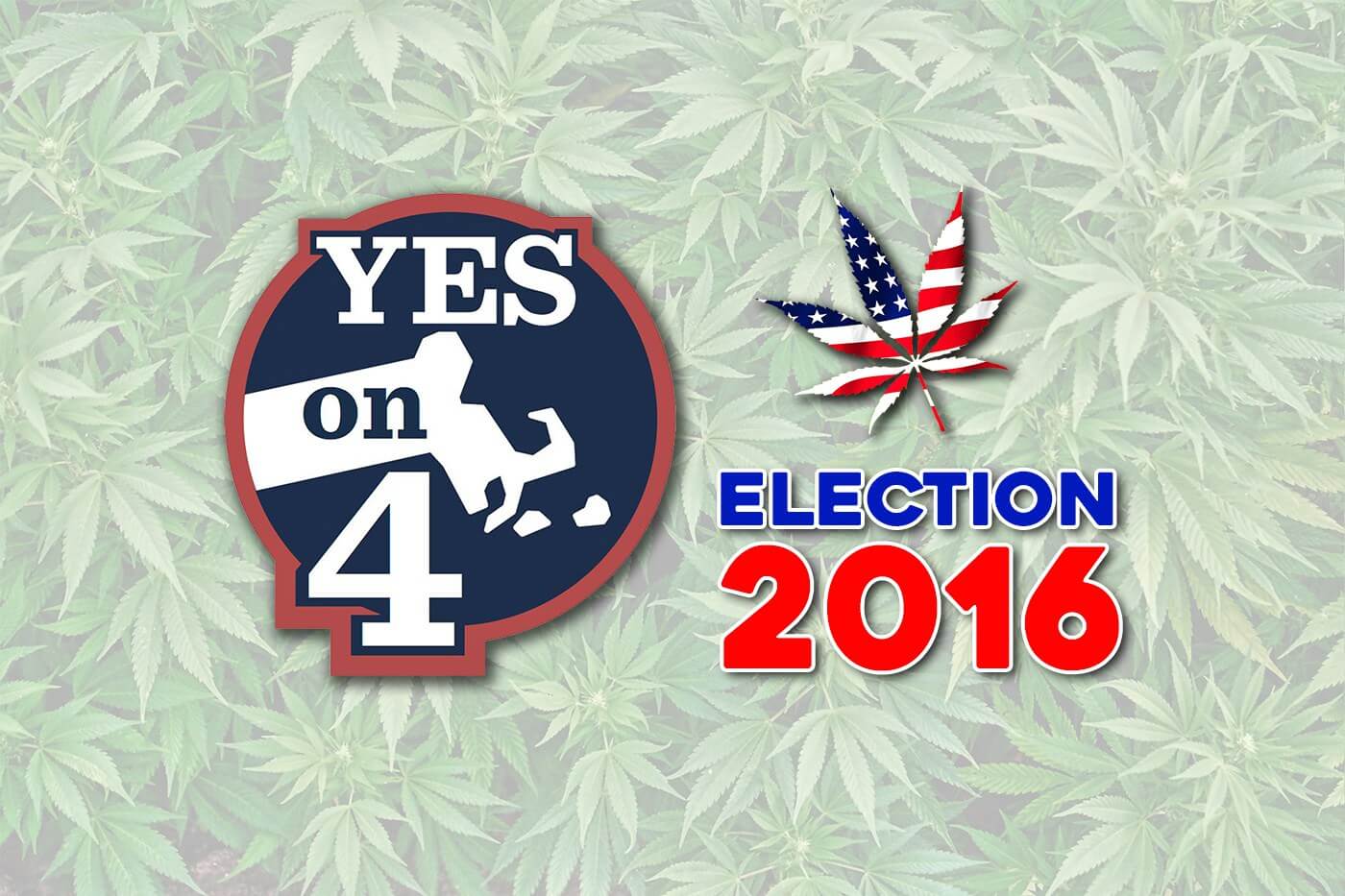Legalizing Weed in Massachusetts is More Than Just a Stoner Vote
The marijuana legalization in Massachusetts initiative, also known as Question #4 is on the November 8, 2016 ballot. So, what’s the status? According to the latest survey from the Western New England University Polling Institute, most people in Massachusetts support a YES to #4 vote. That means that 61 percent of the Massachusetts population backs the legalization of marijuana for recreational and commercial use by adults over the age of 21.
What Does it All Mean?
It can get confusing sorting through all of the Question #4 arguments. Here is a quick breakdown of what a “No” or “Yes” vote on #4 would mean.
YES on #4
A YES on #4 vote would support the proposal to legalize marijuana but regulate it in similar ways as alcohol. The proposed law would allow the possession, use, distribution, and cultivation of marijuana (in limited amounts) by adults ages 21 and older, removing criminal penalties.A YES on #4 vote would authorize adults (21 years+) to possess up to one ounce of marijuana outside of their residences as well as up to ten ounces of marijuana inside their homes, and they could grow up to six plants at home.If passed, the proposed law would also authorize cities to reasonably restrict the time, place, and manner of marijuana businesses and to limit the number of marijuana establishments in their communities.Supporters of Yes on #4 say that setting up a tightly regulated system for retail shops, and allowing citizens to home grow their own pot would reduce black market sales. NO on #4 A NO on #4 vote would oppose the proposal, and keep marijuana use in Massachusetts strictly medicinal.Opponents to Question #4 say that legalization of recreational marijuana in Massachusetts would allow large-scale sales of cannabis similar to that of “Big Tobacco.” Challengers of #4 argue that the proposed regulatory taxes on legal marijuana are too low.NO on #4 voters also claim that passing this initiative ignores the deadly opioid epidemic and the potential impact of legalized pot on overall drug use.However, some say that pharmaceuticals are the true gateway drug, and that marijuana could in fact help reduce opioid overdoses in the U.S.A Parent’s Worst Nightmare? One of the biggest obstacles to passing Question #4 is the parental opinion. One anti-pot ad claims that, [in states where recreational marijuana is legal] “…there are more pot shops than McDonald’s and Starbucks combined…”Is that really the worst thing that could happen to children? After all, McDonalds’ advertising blatantly (and successfully) targets young children. Studies have confirmed that children between 3-5 years old prefer McDonalds branded foods – even when given two identical food items.(1)Here is a sample of a McDonalds menu item:1 Hamburger: Calories: 240 g, Sugar: 6 gWhy are there 6 grams of sugar in a hamburger anyway?And one from Starbucks: 1 Iced Espresso Vanilla Late: Calories: 130 g, Sugar: 19 gThat’s almost an entire daily allowance of sugar – in one beverage!(2-3)Would it really be so bad for children to see more marijuana business than candy stores disguised as hamburger stands and coffee shops?The Fiscal Consequences
NO on #4 A NO on #4 vote would oppose the proposal, and keep marijuana use in Massachusetts strictly medicinal.Opponents to Question #4 say that legalization of recreational marijuana in Massachusetts would allow large-scale sales of cannabis similar to that of “Big Tobacco.” Challengers of #4 argue that the proposed regulatory taxes on legal marijuana are too low.NO on #4 voters also claim that passing this initiative ignores the deadly opioid epidemic and the potential impact of legalized pot on overall drug use.However, some say that pharmaceuticals are the true gateway drug, and that marijuana could in fact help reduce opioid overdoses in the U.S.A Parent’s Worst Nightmare? One of the biggest obstacles to passing Question #4 is the parental opinion. One anti-pot ad claims that, [in states where recreational marijuana is legal] “…there are more pot shops than McDonald’s and Starbucks combined…”Is that really the worst thing that could happen to children? After all, McDonalds’ advertising blatantly (and successfully) targets young children. Studies have confirmed that children between 3-5 years old prefer McDonalds branded foods – even when given two identical food items.(1)Here is a sample of a McDonalds menu item:1 Hamburger: Calories: 240 g, Sugar: 6 gWhy are there 6 grams of sugar in a hamburger anyway?And one from Starbucks: 1 Iced Espresso Vanilla Late: Calories: 130 g, Sugar: 19 gThat’s almost an entire daily allowance of sugar – in one beverage!(2-3)Would it really be so bad for children to see more marijuana business than candy stores disguised as hamburger stands and coffee shops?The Fiscal Consequences If Question #4 were to pass, voters want to know, “Where would all of the marijuana money go?” Well… currently the fiscal consequences are hypothetical as there is very limited data including this from a March 2016 report by the Special Senate Committee: “Tax revenues and fees that would be generated from legal sales may fall short of even covering the full public and social costs (including regulation, enforcement, public health and safety, and substance abuse treatment).However, because there is limited reliable information, the accuracy of these projections is questionable.Back in 2008, Massachusetts voters decriminalized small amounts of marijuana and in 2012, the majority passed a vote to legalize marijuana for medicinal use. What will the future of marijuana in Massachusetts be in 2016? Only the results of Tuesday’s election will tell. See you at the polls!
If Question #4 were to pass, voters want to know, “Where would all of the marijuana money go?” Well… currently the fiscal consequences are hypothetical as there is very limited data including this from a March 2016 report by the Special Senate Committee: “Tax revenues and fees that would be generated from legal sales may fall short of even covering the full public and social costs (including regulation, enforcement, public health and safety, and substance abuse treatment).However, because there is limited reliable information, the accuracy of these projections is questionable.Back in 2008, Massachusetts voters decriminalized small amounts of marijuana and in 2012, the majority passed a vote to legalize marijuana for medicinal use. What will the future of marijuana in Massachusetts be in 2016? Only the results of Tuesday’s election will tell. See you at the polls!

